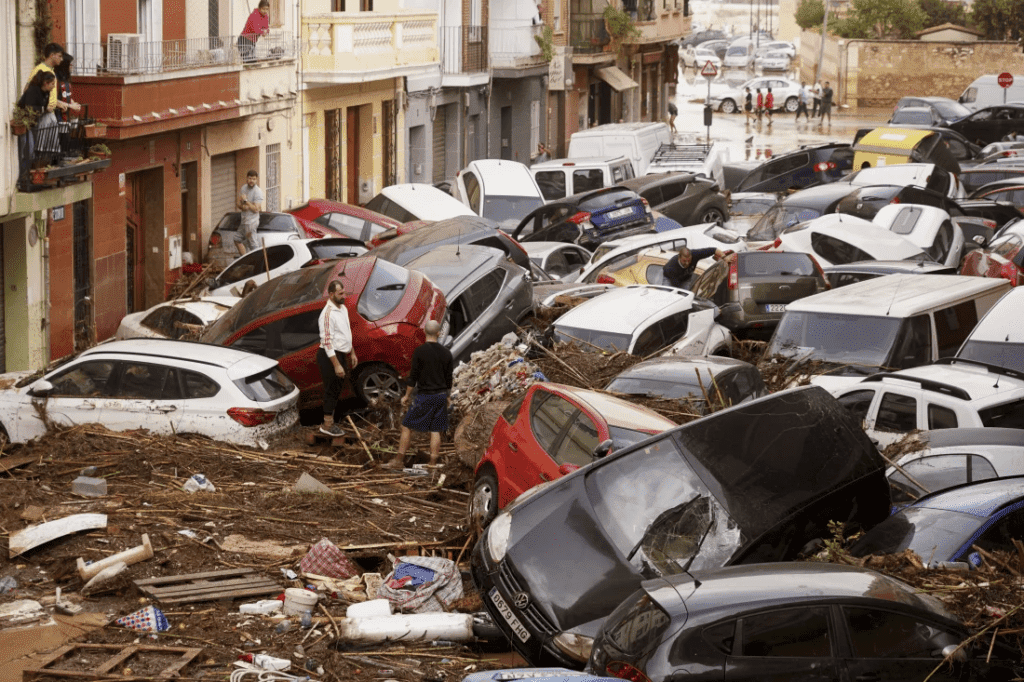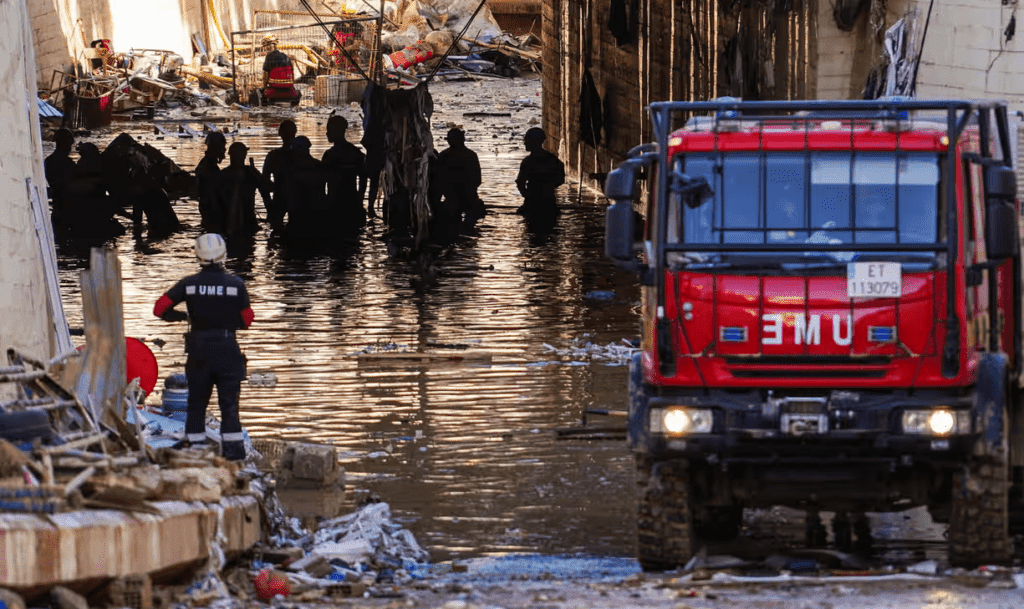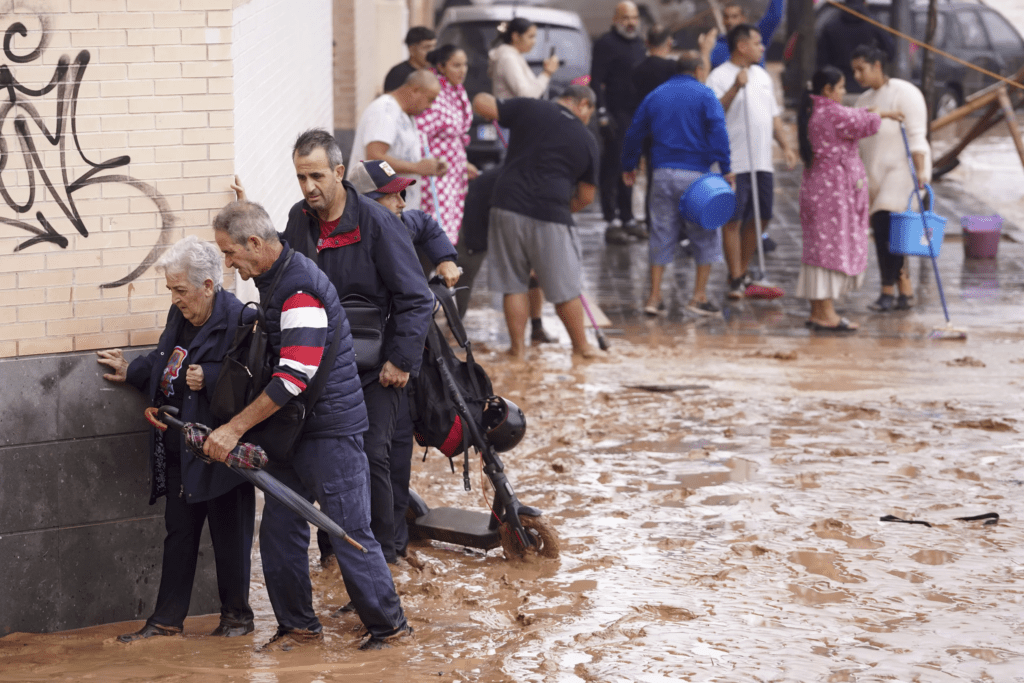Spain has been hit by severe flooding over recent days, with the regions of Valencia, Murcia, and Alicante bearing the brunt of the destruction. Torrential rains have transformed streets into rivers, displaced thousands, and led to tragic casualties. As families search for missing loved ones, emergency services and volunteers are working around the clock, illustrating both the tragedy and resilience of the human spirit in times of disaster.
The Scale of the Flooding
According to recent reports, the rainstorms are some of the most intense that Spain has seen in years, with rainfall levels reaching unprecedented heights. In Valencia, iconic neighborhoods and landmarks have been submerged, while Murcia and Alicante have faced similar devastation, with overflowing rivers and collapsed infrastructures. The Spanish government has declared disaster zones in these regions as efforts to mitigate further damage continue.

Images and videos shared by BBC News show streets filled with murky, debris-filled water, citizens trapped on rooftops awaiting rescue, and emergency crews navigating hazardous conditions to reach stranded individuals. The visuals capture the widespread devastation and underscore the urgency of response efforts.
Government Response and Criticism
In response to the unfolding crisis, Prime Minister Pedro Sánchez announced that the Spanish government will deploy an additional 5,000 troops and 5,000 police officers to the flood-affected regions. This bolstered security presence aims to enhance rescue efforts, maintain order, and provide much-needed support to overwhelmed local authorities.
However, local officials are facing criticism for what some residents see as a delayed response to the floods. As reported by NPR, citizens in Valencia and surrounding areas have voiced frustrations, questioning why stronger preventative measures weren’t in place and why the initial response seemed slow. This criticism has prompted discussions on improving disaster preparedness and response times, particularly as climate-induced weather events become more frequent.
Rescue Operations and Search Efforts
Rescue operations in Valencia, Murcia, and Alicante have been especially challenging given the intensity of the floods. Emergency responders from local units, the Red Cross, and various volunteer groups have been deployed across these areas, focusing on saving lives and offering immediate relief to those in need. In many regions, helicopters are being used to airlift people from isolated areas, while rescue boats have become essential for reaching neighborhoods cut off by floodwaters.

CNN reports that while many families have been reunited, searches are still ongoing for those who remain missing. The emotional toll on communities is palpable, as neighbors and friends band together to locate loved ones. The Spanish government’s deployment of additional personnel emphasizes its commitment to these search and rescue efforts, drawing support from neighboring countries and international organizations that have offered assistance.
One volunteer, captured on video by a BBC journalist, expressed the determination driving these efforts: «We may not be able to stop the rain, but we can ensure that no one faces this tragedy alone.»
The Humanitarian Crisis
Beyond the immediate danger, the flooding has also led to a humanitarian crisis. Thousands of residents in Valencia, Murcia, and Alicante are now displaced, with their homes and belongings destroyed. With shelters filling up quickly, there is an urgent need for food, clean water, medical supplies, and basic necessities. Local governments have set up temporary shelters in schools and community centers, and the Red Cross has been providing food and essential supplies to those affected.

According to BBC reports, some residents feel a sense of guilt for continuing with their lives as usual while their neighbors suffer. “It’s heartbreaking to see our town like this,” said one resident from Valencia. “I feel so lucky to be safe, but at the same time, it’s hard not to feel guilty when others have lost so much.”
Environmental and Climate Implications
The recent floods in Valencia, Murcia, and Alicante have brought renewed attention to the pressing issue of climate change. Environmental experts note that extreme weather events, including intense rainfalls and flooding, are becoming more frequent and severe as global temperatures rise. This disaster has reignited conversations on climate resilience and the importance of infrastructure that can withstand future climate challenges.
Local environmental groups have urged the government to take stronger actions to combat climate change and prepare for future natural disasters. Increased funding for flood defenses, improved urban planning, and emergency preparedness measures are some of the steps that experts believe could help mitigate the impact of future floods.
Moving Forward: Recovery and Rebuilding
As the floodwaters begin to recede, Spain faces the daunting task of rebuilding. The government has pledged significant financial support to help Valencia, Murcia, and Alicante recover, with plans for both short-term relief and long-term rebuilding initiatives. However, the process will be neither quick nor easy. Roads, bridges, homes, and public infrastructure will require extensive repairs, and displaced families will need substantial support to rebuild their lives.
For now, Spain stands united in its grief and hope. Communities are organizing donation drives, international organizations are pledging aid, and volunteers continue to offer their support. This collective resilience will be essential as the country faces the long journey of recovery.
Planning a Trip to Spain?
If you’re planning to visit Spain, it’s important to stay informed about the current situation, especially if your travel plans include Valencia, Murcia, or Alicante. While these regions are recovering, it’s crucial to monitor updates on local conditions and potential travel advisories.
For more information on booking accommodations and insider tips for a smooth stay in Spain, check out this comprehensive guide: Online Hotel Reservations for Hotels in Spain – Top Booking Portals and Insider Tips. This article can help you plan your trip with reliable booking resources and insights.


Comentarios recientes